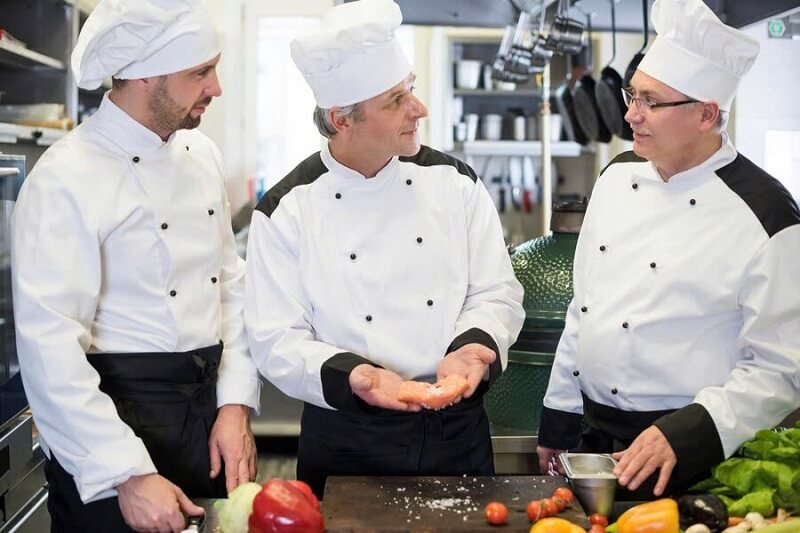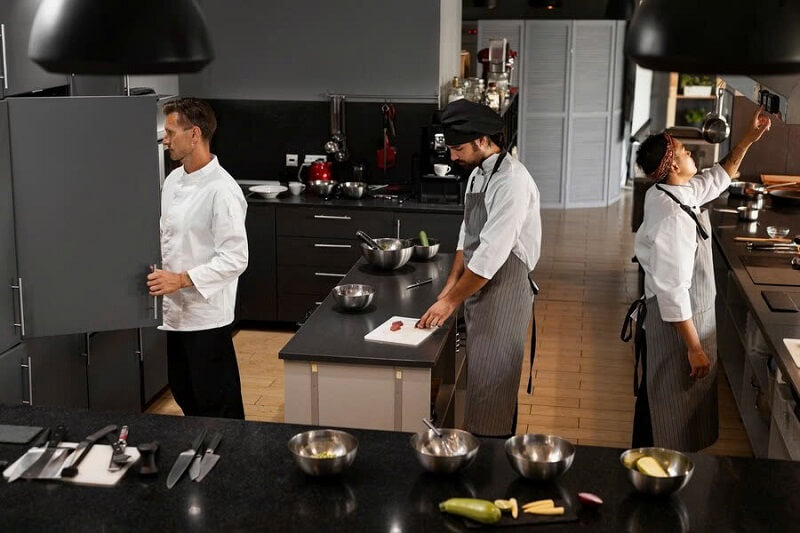Comprehensive Guide: Job Description Executive Chef
The role of an executive chef is not just about cooking exquisite dishes; it’s about leading a kitchen, managing teams, and crafting unforgettable culinary experiences. For those aspiring to excel in this prestigious profession, understanding the job description executive chef is the first crucial step. This article offers a comprehensive guide, from key responsibilities to essential skills, to help you master this challenging yet rewarding role.
The job description executive chef extends far beyond the typical culinary tasks. It encapsulates leadership, creativity, and operational expertise, making it one of the most demanding roles in the culinary industry. This section dives deep into the primary responsibilities of an executive chef, highlighting how each aspect contributes to a thriving kitchen environment.
1. Core Responsibilities of an Executive Chef
An executive chef is the backbone of a professional kitchen. Their responsibilities revolve around ensuring the smooth operation of culinary activities while maintaining high standards of quality and innovation.

1.1. Overseeing Kitchen Operations
Managing a kitchen is akin to orchestrating a symphony, where every staff member and task must align seamlessly. The executive chef oversees everything from menu planning to ingredient procurement, ensuring that the team operates efficiently. In large establishments such as hotels, the role expands to supervising multiple kitchens, each with unique demands and challenges.
1.2. Creating and Innovating Menus
An essential part of the job description executive chef is menu development. This involves not only designing dishes that reflect the restaurant’s identity but also innovating with seasonal ingredients and culinary trends. Executive chefs must strike a balance between creativity and practicality, ensuring dishes are both visually appealing and operationally feasible.
1.3. Leading and Managing Kitchen Staff
One of the critical aspects of the job description executive chef is team management. The executive chef acts as both a mentor and leader, ensuring the kitchen staff works cohesively to achieve common goals. From training junior chefs to resolving conflicts, this role demands strong interpersonal skills. Effective communication and the ability to inspire the team are vital for maintaining morale and productivity, particularly during high-pressure situations such as dinner service in a busy hotel.
1.4. Ensuring Food Safety and Hygiene Standards
In professional kitchens, maintaining food safety and hygiene is non-negotiable. The executive chef must establish protocols that comply with local health regulations, ensuring all staff adheres to these standards. This involves regular inspections, training sessions, and documentation to guarantee that the kitchen meets or exceeds expectations. The ability to manage this aspect effectively is a hallmark of a successful executive chef.
2. Essential Skills for an Executive Chef
An executive chef's success hinges on a unique blend of skills that go beyond culinary expertise. To thrive in this challenging role, aspiring chefs must cultivate the following abilities:

2.1. Culinary Expertise and Creativity
The foundation of the job description executive chef lies in culinary mastery. This includes a deep understanding of cooking techniques, flavor profiles, and presentation styles. However, creativity is equally important; executive chefs must constantly innovate to stay ahead of culinary trends. This ability to think outside the box often sets exceptional chefs apart in competitive markets.
2.2. Financial Acumen
While artistry defines a chef's craft, financial management ensures the kitchen's sustainability. The executive chef oversees budgeting, inventory control, and cost analysis, balancing quality with profitability. For instance, optimizing ingredient usage and reducing waste are practical ways to enhance efficiency without compromising the dining experience.
2.3. Leadership and Decision-Making Skills
An executive chef is not only a culinary artist but also a decisive leader. This role demands the ability to make quick yet effective decisions, particularly in high-stakes situations like peak service hours. For instance, when a sudden ingredient shortage arises, the executive chef must swiftly adapt by modifying recipes or substituting ingredients without compromising quality. Strong leadership fosters trust and respect among team members, empowering them to perform at their best under pressure.
2.4. Adaptability to Changing Trends
The culinary industry evolves rapidly, with new trends, techniques, and consumer preferences constantly reshaping the landscape. A successful executive chef stays ahead by embracing these changes, whether it involves integrating plant-based menus, adopting sustainable practices, or leveraging modern cooking technologies. By staying adaptable, executive chefs ensure their establishments remain competitive and appealing to diverse customer bases.
3. Career Opportunities for Executive Chefs
The job description executive chef opens doors to diverse career paths, each offering unique challenges and rewards. This section explores the most common opportunities, providing insights into how chefs can advance their careers.

3.1. Executive Chef in Hotels
Hotels often represent the pinnacle of culinary leadership, requiring executive chefs to manage multiple kitchens catering to varied dining experiences. From fine-dining restaurants to casual buffets, the scope of responsibility is vast. In this role, the executive chef ensures consistency across all venues while maintaining the hotel’s culinary reputation. For example, an executive chef at a five-star hotel might oversee gala dinners, international cuisine, and VIP events, all requiring meticulous planning and execution.
3.2. Restaurant Ownership and Consulting
Many executive chefs transition to entrepreneurial ventures, such as owning restaurants or consulting for culinary startups. This pathway allows chefs to showcase their creativity and business acumen, crafting unique dining concepts and guiding establishments to success. For instance, consulting roles might involve helping a new restaurant design menus, train staff, and implement operational strategies aligned with market trends.
3.3. Executive Chef in Cruise Lines
Working as an executive chef on a cruise line is a unique opportunity that combines culinary expertise with global exploration. This role involves managing large-scale kitchen operations while catering to an international clientele with diverse tastes. Unlike stationary establishments, cruise line chefs face logistical challenges such as limited storage and supply chain constraints. However, the reward lies in the ability to create memorable dining experiences for thousands of guests while traveling across the world.
3.4. Corporate and Private Catering
Another promising avenue within the job description executive chef is corporate and private catering. Executive chefs in this domain design personalized menus for events such as weddings, corporate galas, and private parties. The focus here is on customization and high-quality service, ensuring every detail meets or exceeds client expectations. This field demands flexibility and creativity, as each event brings unique challenges, from dietary restrictions to thematic presentations.
4. Building a Successful Career as an Executive Chef
Becoming a successful executive chef requires a combination of education, experience, and continuous growth. This section outlines the key steps to achieve excellence in this competitive field.

4.1. Pursuing Formal Culinary Education
While natural talent is essential, formal training lays the foundation for a chef’s career. Many executive chefs begin their journey by enrolling in culinary schools, where they learn fundamental techniques, kitchen management, and menu planning. For example, institutions like Le Cordon Bleu or local culinary academies in the Philippines provide hands-on training that prepares students for real-world challenges.
4.2. Gaining Practical Experience
Experience in diverse kitchen settings is crucial for aspiring executive chefs. Starting as a line cook and gradually taking on more responsibilities allows chefs to develop a holistic understanding of kitchen operations. Working under seasoned mentors and tackling different cuisines adds depth to their expertise, building the confidence needed to lead their own teams. Additionally, mastering job interview tips can help candidates effectively present their experience and vision during the recruitment process.
4.3. Networking and Building Professional Relationships
Networking is a vital aspect of advancing in the culinary world. Executive chefs must cultivate relationships with suppliers, fellow chefs, and industry professionals. These connections can lead to collaborative opportunities, better ingredient sourcing, and valuable mentorship. For instance, attending culinary expos or joining professional organizations like the Philippine Culinary Federation can open doors to exclusive career opportunities.
4.4. Embracing Continuous Learning
The culinary industry is ever-changing, and staying updated is essential for long-term success. Executive chefs can benefit from attending workshops, participating in masterclasses, or pursuing advanced certifications in areas like food sustainability or molecular gastronomy. Continuous learning not only sharpens their skills but also positions them as innovators in the field, ensuring their relevance and competitiveness.
5. Challenges in the Job Description Executive Chef
The job description executive chef is both rewarding and demanding. Understanding the challenges that come with the role is key to navigating and thriving in this profession.

5.1. Managing Stress and Long Hours
Executive chefs often face high-pressure environments, especially during peak service times. Balancing creativity with operational efficiency while maintaining team morale can be stressful. Developing effective stress management techniques, such as delegation and time management, is crucial for sustaining success in the long run.
5.2. Meeting Diverse Customer Expectations
Catering to a wide range of tastes and dietary needs is a constant challenge. Whether it’s accommodating vegan diets, halal requirements, or gluten-free options, executive chefs must ensure that all guests receive an exceptional dining experience. This requires meticulous planning and a deep understanding of global cuisines. When asked, ‘what motivated you to apply for this position,’ chefs often highlight their passion for creating inclusive menus that cater to diverse preferences, showcasing their ability to meet customer expectations.
Conclusion: The Path to Becoming a Culinary Leader
The job description executive chef embodies a unique blend of leadership, creativity, and resilience. From managing bustling kitchens to crafting innovative menus, the role is as dynamic as it is demanding. By honing essential skills, embracing continuous learning, and building strong professional networks, aspiring chefs can excel in this prestigious career.
Whether you dream of leading a five-star hotel kitchen or starting your own restaurant, the journey begins with understanding the depth of responsibilities and opportunities that come with being an executive chef. Step by step, the culinary world awaits those who dare to innovate and lead.
- Essential Job Description Supervisor Guide for Success
- Essential Job Description Sales Guide for Success
- Job Description Restaurant Manager – Roles & Skills
- Understanding the job description project coordinator role
- Job Description HR Assistant—Roles and Responsibilities
- Essential Guide to Job Description COO
- Comprehensive Job Description Admin Assistant Insights
- A Comprehensive and In-Depth Job Description for HR Generalist
- Comprehensive Guide: Job Description Executive Chef
- Top 5 Best Job Search Sites for Easy Job Applications
- QA Job Description: Key Skills and Roles in 2025
- The Complete Clerk Job Description Guide
- What Is Your Greatest Weakness? Mastering the Answer
- Master the Phone Interview for Career Success
- Crafting the Perfect CV Personal Statement
- What is a Job Description Warehouse Worker?
- Detailed job description teller bank for career growth
- Comprehensive Job Description Store Manager Guide
- Comprehensive Guide to Job Description Personal Assistant
- Comprehensive Guide to Job Description Nursing Assistant
- Comprehensive Job Description Graphic Designer Guide
- Comprehensive Job Description Chief of Staff Guide
- Comprehensive Job Description Cleaner Guide
- Comprehensive Job Description Assistant Manager
- Comprehensive Guide to Job Description Account Executive
- Comprehensive Guide to Secretary Job Description
- Comprehensive Job Description of Teaching Assistant
- Comprehensive Job Description for a Social Media Manager
- Mastering STAR Interview Techniques: The Ultimate Guide
- “I Hate My Job” – What You Should Do Next
- What Is a Job Description Team Leader?
- A Complete Guide to Job Description Sales Assistant
- Comprehensive Job Description for Security Guards
- Detailed Job Description for HR Manager
- The Ultimate Guide to Job Description Medical Assistant
- Job Description Housekeeping: Key Roles & Responsibilities
- Job Description Merchandiser: Key Roles & Skills
- Job Description Product Manager: Roles and Responsibilities
- Job Description Account Manager: Roles and Responsibilities
- Job Description Marketing Manager: Roles & Skills
- Job Description HR: The Essential Guide for HR Professionals
- Best Jobs for Introverts: Top Careers for Quiet Thinkers
- What is Your Greatest Strength? How to Answer Effectively
- Job Description Data Entry Guide
- Detailed Job Description Sales Manager Guide
- The Importance of Work Experience on a Resume
- Comprehensive Job Description Sales Representative Insights
- Comprehensive Job Description of Project Manager
- Job Description Executive Assistant: Key Responsibilities
- Job Description for Sales Executive: Key Roles and Skills
- Job Description Customer Service Roles
- Job Description Business Analyst: Roles and Skills
- Comprehensive Job Description for a Receptionist
- Mastering the Sales Associate Job Description
- Understanding Accountant Job Description in Detail
- Hard Skills vs Soft Skills: Key Differences and Examples
- Why Do You Want to Work Here? Best Answer and Examples
- How to Decline a Job Offer Politely and Gracefully
- Comprehensive Job Description of Waitress
- Job Description Cashier: Key Responsibilities and Skills
- Where Do You See Yourself in 5 Years?
- Mastering Problem Solving Skills for Career Success
- Effective Job Description Sample Guide
- Behavioral Interview Questions Guide
- Comprehensive Job Description for an Administrative Assistant
- Essential Job Titles for Career Success
- Master Leadership Skills for Effective Management
- How to Write a Perfect Motivational Letter
- CV vs Resume: Understanding the Key Differences
- Top Reasons for Leaving a Job Today
- What Is a Resignation Letter? Key Details You Must Know
- How to Write a Perfect Job Application
